
Encouraging students to flourish and thrive



Encouraging students to flourish and thrive

At Wimbledon High School we are proud of the academic successes of our students. Outstanding results at GCSE and A Level every year regularly see us in the top 20 schools in the country.
Playful scholarship may seem a contradiction but at Wimbledon High we are as serious about play as we are about academic rigour – and indeed, the one cannot exist without the other.
As a highly selective school with great academic results, it would be tempting to double-down on curriculum-based learning and the achievement of yet more strings of top grades.
But we want our students to feel enlivened and inspired by their learning whilst they are at school, to have fun and use their imaginations, whilst also developing the skills they’ll require in their future lives; and so we take a slightly different approach.
Curiosity is developed through problem-solving, whilst our interdisciplinary STEAM+ approach fosters the making of connections and linking of
Students are encouraged to work together and independently, to weave technology into their research and studies but do so with a critical mind, and to challenge and question themselves, their classmates and their teachers without fear of failure. The greatest scholars understand along with Einstein that the more they learn, the more they realise there is to know – and that is the most exciting adventure of all on which to embark. Playful
ideas. In our Civil Discourse curriculum, students learn to listen and debate with dexterity and an open mind, shunning ideas of offence or cancel culture; and our bespoke, non-examined, PPE course allows for the development of real-world understanding of our political and economic climate, as well as of the foundations of philosophical thought.
“The classroom, with all its limitations, remains a location of possibility. In that field of possibility, we have the opportunity to labour for freedom, to demand of ourselves and our comrades an openness of mind and heart...” bell hooks
Jean Piaget referred to play as “the work of childhood”, recognising that play is not just idle amusement or a mere pastime but a fundamental process through which children learn, make sense of their experiences, and construct knowledge about the world around them.
Play, however, is no longer at the centre of most childhoods. The reality for our children is that they will grow up in a social media world that is increasingly risk adverse, monitored, and measured; one that is detrimental to their selfefficacy, creativity, and resilience. At Wimbledon High School we believe that, as children move into adolescence, we have a duty to preserve, nurture, and enhance, the passions of our young people; never losing the essential qualities of the fundamental process of a play-based childhood in our teaching and learning.
Our commitment is not merely ideological: it is borne from the observation of teenage thinking having become more brittle in recent years. The lockdown years and too much time spent on social media (by adults and children alike) have propagated binary narratives, as we see being played out daily in politics internationally. Even universities, once bastions of new ideas and free speech, are now being accused of inculcating a fragility and the use of emotional reasoning rather than debate and rational thought. At WHS we want to safeguard the toying of ideas, the tussle of chewing over an argument. That’s the ‘playful’. And with social media algorithms competing for the attention spans of
our children, we encourage our young people to dive into their work, to experience the ‘flow’ of becoming immersed in it. That’s the ‘scholarship’. For the psychologist Mihaly Csikszentmihalyi, flow is characterised by feelings of happiness, fulfilment, and meaning. We all know the joy of concentrating so hard on the task at hand that time passes, self-consciousness ebbs away and we have the satisfaction of a sense of purpose in our creativity. Play often induces this state of flow.
Plato is credited with the quotation, “Do not, my friend, keep children to their studies by compulsion, but by play.” We too recognise that children cannot be compelled to learn, to speak, or to flourish. Flow comes from nurturing the spark of a new passion or interest. It is recognition that scholastic rigour, playful thought, and academic curiosity are the basis for fun and that fun is based on a deep and unquenchable thirst for knowledge.
Playful approaches in the classroom encourage our girls to think critically, analyse situations, to cultivate their individual voice and to collaborate with an open mind to find creative solutions. A scholar who is flexible in their thinking is one
less likely to be offended, to call for something to be cancelled, or to be afraid to share their opinion. You will read in coming pages the specific skills that we believe a Wimbledon High education fosters.
To play is to grow and in growing we hope not to lose our appetite to play. That is why our PLAY and GROW programmes recognise the symbiotic relationship between what other institutions might silo as academic and pastoral. You cannot embrace dexterity of thought, passions, and motivation, without understanding the holistic individual. In GROW we teach the embracing of
Learning to learn is, as we know, a skill in itself. WHS Learning Power takes the playful element and encourages students to think about what they are learning, why and how. It’s a metacognitive approach that we build into lessons and our GROW programme.
diverse perspectives and a culture of respectful dialogue and intellectual exploration. Within our inclusive community – a community in which, as our neurodivergent students remind us, we are all different, all human.
In summary, we know it is a child’s natural inclination to explore, discover and learn. Playful scholarship throughout life is about finding joy, interest, and personal relevance in learning, being active participants in education and in life, leading to a deeper and more meaningful understanding emotionally, socially and intellectually. of this world of ours.
Wider than traditional study skills, it provides a framework for developing the essential competencies needed to become lifelong learners and thriving 21st century citizens: Risk-taking and problem-solving; Collaboration and communication and Independence and leadership, which you can read about in coming pages.

The 19th century roots of the Girls’ Day School Trust are pioneering and disruptive. Out of bold aspiration to challenge the status quo and provide secondary education to girls, the GDST was formed.
And so, it is no surprise that we want our students to be disruptive thinkers for the 21st century. Our ambitious, intellectually curious girls are independent and ready to take risks in their learning. They don’t play it safe.
Step inside an English classroom, and you will hear considered challenges to Shakespeare from a feminism or diversity viewpoint. Peek into a Geography classroom, and you will hear voices curiously considering today’s geopolitics. Come along to our bioinformatics big data club and you will hear how our students work online alongside academics and post-doctorate students from universities and institutes from the UK and beyond. This leads to sixth formers publishing their own novel research in academic journals – something usually more akin to post-doctorate study.
Thinking creatively around a problem is of course at the heart of STEAM – an interdisciplinary focus that brings together science, technology, engineering, the arts and Maths and sees students working across subjects to tackle real world issues.
And when asking students to push boundaries, helping them build resilience is essential: knowing they can try, possibly fail, and pick themselves up to try again, amongst friends and peers who wish them well. As the first school to have held a Failure Week many years ago, we ensure that lesson planning by teachers gives thought to how students in class are going to take intellectual risks. Stepping outside comfort zones and trying something new is of course reinforced in our co-curricular programme of clubs and activities.
And the planning of those lessons, under playful scholarship, involves our teachers sharing their passions, inspiring wonder in the classroom. Life-long learners themselves, they regularly contribute their latest thinking pedagogy in blogs on our Teaching and Learning Hub.
“ Once we believe in ourselves, we can risk curiosity, wonder, spontaneous delight, or any experience that reveals the human spirit” ee cummings
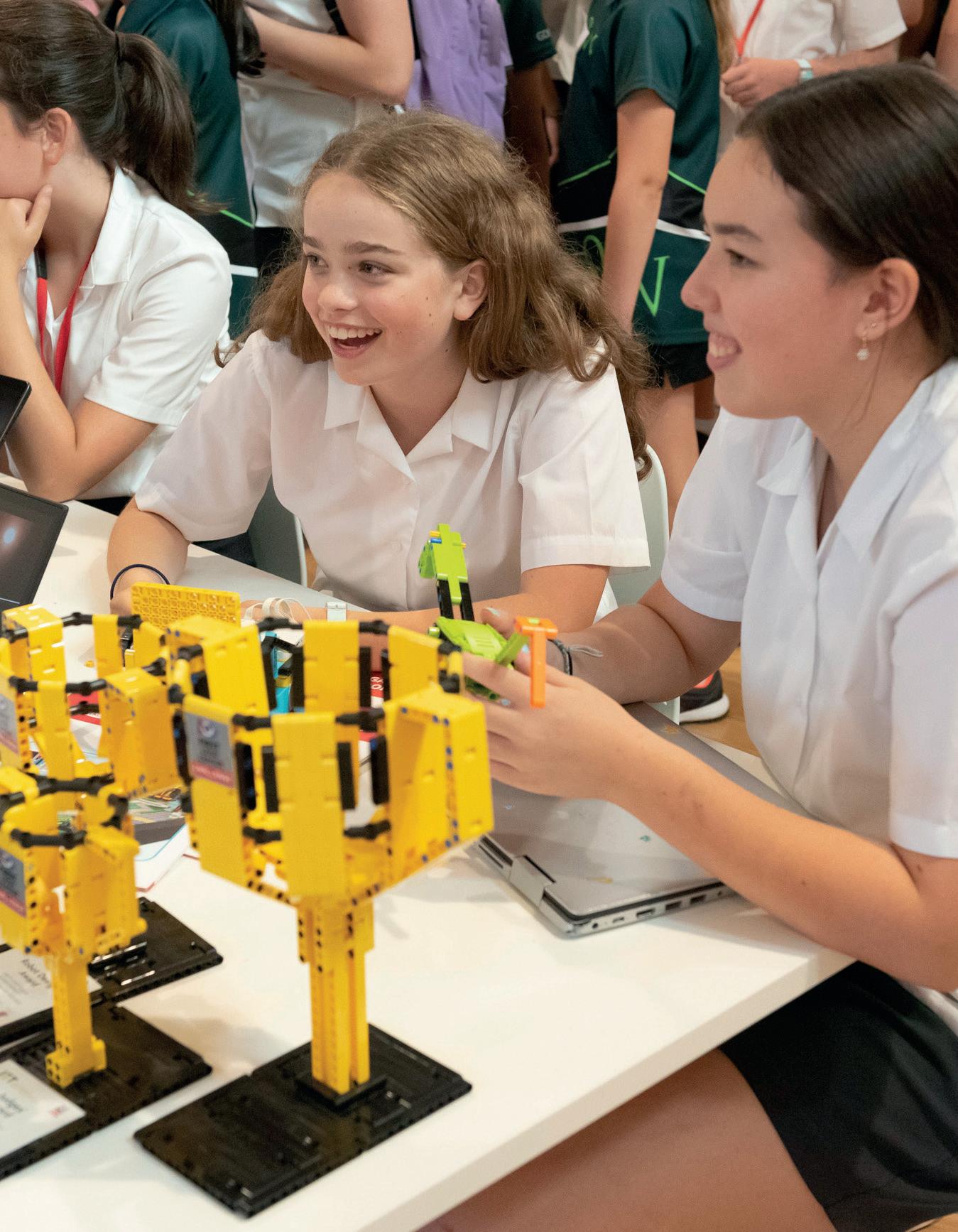
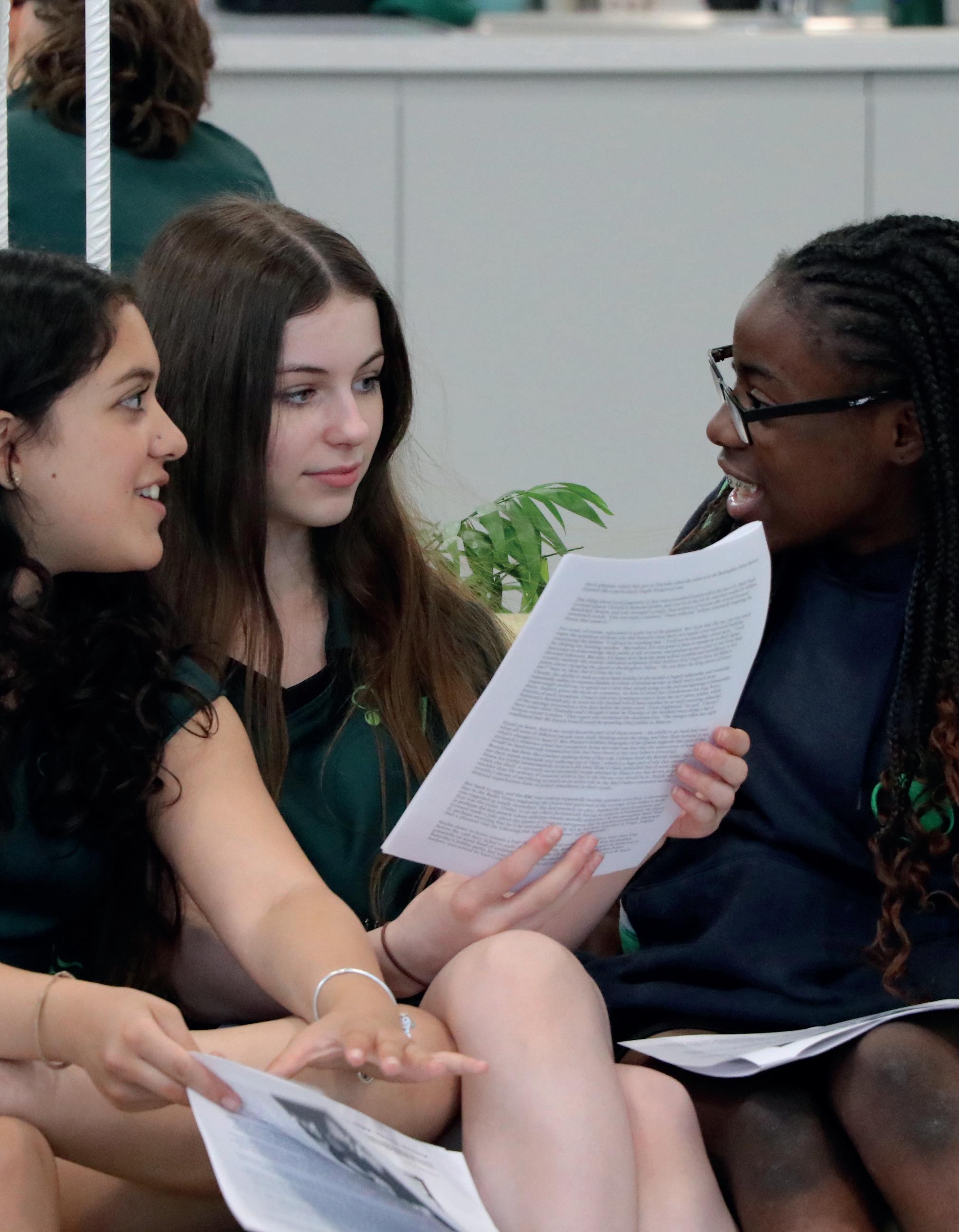
Collaboration has become a fashionable buzzword, present in every conversation about 21st century skills. Here at WHS we ensure that our approach is far from superficial.
Collaboration and communication are not limited to ‘project work’ - after all, what is the relationship between students and teacher if not a collaborative effort to expand our knowledge and understanding of the world?
First and foremost, we model and practise the skills of listening and questioning, so that when students work in groups in the classroom their collaboration is authentic and meaningful. We find our best problem solvers are the most attentive listeners, those with the emotional intelligence to understand the importance of compassion and empathy, and to listen respectfully to those whose opinions they do not share.
A few years ago, in response to the binary nature of debate all too prevalent in social media, we introduced weekly Civil Discourse
lessons into our curriculum, starting in Year 7.
Learning to analyse how news is covered in the media, or how to engage in Socratic questioning, are just two elements of the course. Across all academic disciplines, students learn to find and own their unique voice. Project Flip has been teaching us to value different voices and alternate ways of thinking – and this brings a richness to our collaborative work.
Giving students agency in the way they collaborate and communicate is a key part of our approach: wherever possible our students will make their own decisions about roles within a team, when, how and indeed whether they are using technology and how to present the outcome of their work to an audience. And teachers sharing their expertise and knowledge helps develop flexible and creative thinking –just what the world needs right now.
“Let us disagree well in order to agree more” Fionnuala Kennedy
At Wimbledon, an academically playful approach leads to the joy of becoming fully immersed in scholarship – and, we hope, a state of flow.
From Year 7 onwards, independent research skills are honed, and we integrate the use of digital tools into metacognition (how we learn to learn). As educators, we are learning how to adapt to, and where appropriate, embrace, artificial intelligence bots such as ChatGPT or Bard. Our students have been thoughtful and reflective, pointing out that amidst the advantages of using these new AI tools, such as ease of accessing data and facts, summarising findings and even creating structures, much of what is potentially lost is the experimentation side of being an academically curious student –where the real learning lies.
As they develop their independence in the pursuit of academic excellence, students can opt in to GDST competitions, hackathons and national essay competitions, frequently winning commendations and awards.
With independence comes owning your voice and we have vibrant debating, Model United Nations and student journalism clubs.
Articles written and edited by our students on our weekly sixth form blog Unconquered Peaks, on Linguistica (our languages blog), and our Ever Green eco blog ensure as a community we give space to new thinking and commentary, with students also able to participate in the Young Reporter Scheme, their monthly articles published online to the public.
Building in time for reflection during the school week and in regular Review & Reflection sessions helps students have ownership of their learning. In lessons, there will always be a mix of individual, paired and group work, and homework is used to foster independence of thought as well as to learn key time management skills.
Opportunities for leadership increase as students get older, culminating in applications for the Student Leadership Team, which has roles from academic subject leads to Head Girl and includes the mentoring of students lower down the school and in our partner schools as well.
“ Our aim is for every student to stride out of school, prepared to shape the society in which she lives and works.”
Wimbledon High School
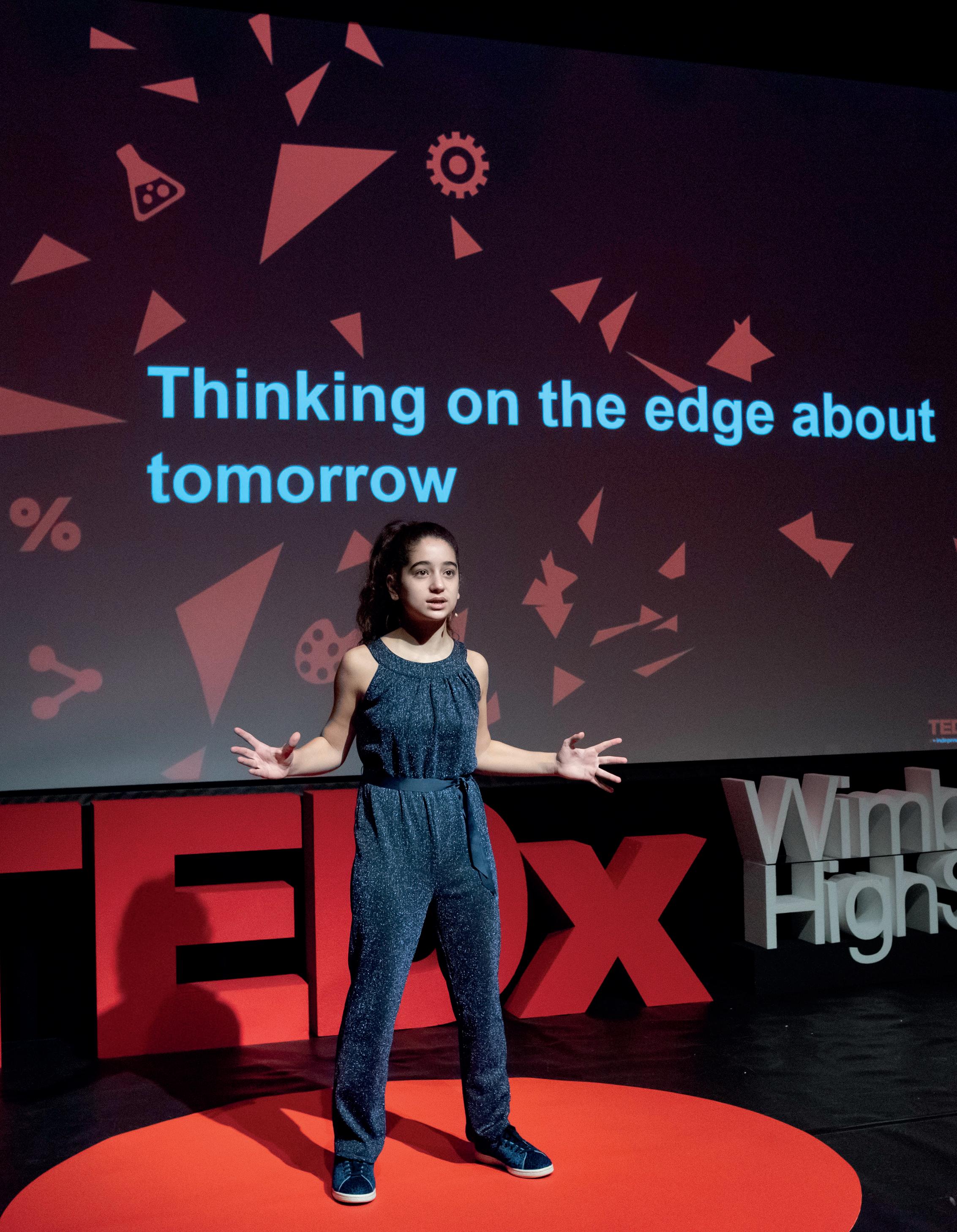
Our classrooms are intended to be places where dialogue and debate are at a premium, and where knowledge and understanding is constructed contextually and collaboratively among the thinkers in the rooms.
We believe that human connection is central to learning, and that metacognition is vital to students. We want to ensure that our use of AI extends students’ knowledge construction and communication skills, rather than undermining them. It can be used in a variety of fields, like art, music, and even writing. Yet as Generative AI does not know or understand the material it has been trained on, it is prone to factual error, or unexpected statements. It is using statistics to create an output – not the knowledge and understanding of a human.
Evaluate AI Critically
• Critically evaluate information generated by AI tools, guided by teachers Declare your sources and working methods
• Teachers should ensure that AI is not used as a shortcut to knowledge or skills with which students are not already familiar
Safety - Data Security and Privacy
• Ensure AI platforms have safety measures in place
• Don’t input personal, sensitive or commercially important information into AI chatbots or systems
• Prevent unsuitable content creation through supervision and age-appropriate platforms
Transparency
• Teachers and Support Staff should acknowledge when AI tools have been used to prepare work or resources.
• Teachers should be candid with students about how they are using AI in their lessons
• Open dialogue and communication should be promoted to build trust among parents, students, and staff regarding the school’s approach to AI
Maintain Academic Integrity
• Present your own work, always Use AI tools only under teacher guidance
• Be honest about AI use and prioritise authentic learning experiences Do not use AI in the process of NEA work
Foster Inclusivity and Equity
• Evaluate AI tools for inclusivity
• Consider diverse student needs in the application of AI
• Learn about systemic bias and risks in AI
AI Transparency: Assisted by GPT4. Rachel Evans and Director of Studies Suzy Pett wrote a position paper on AI and then used GPT4 to summarise the school’s stance.
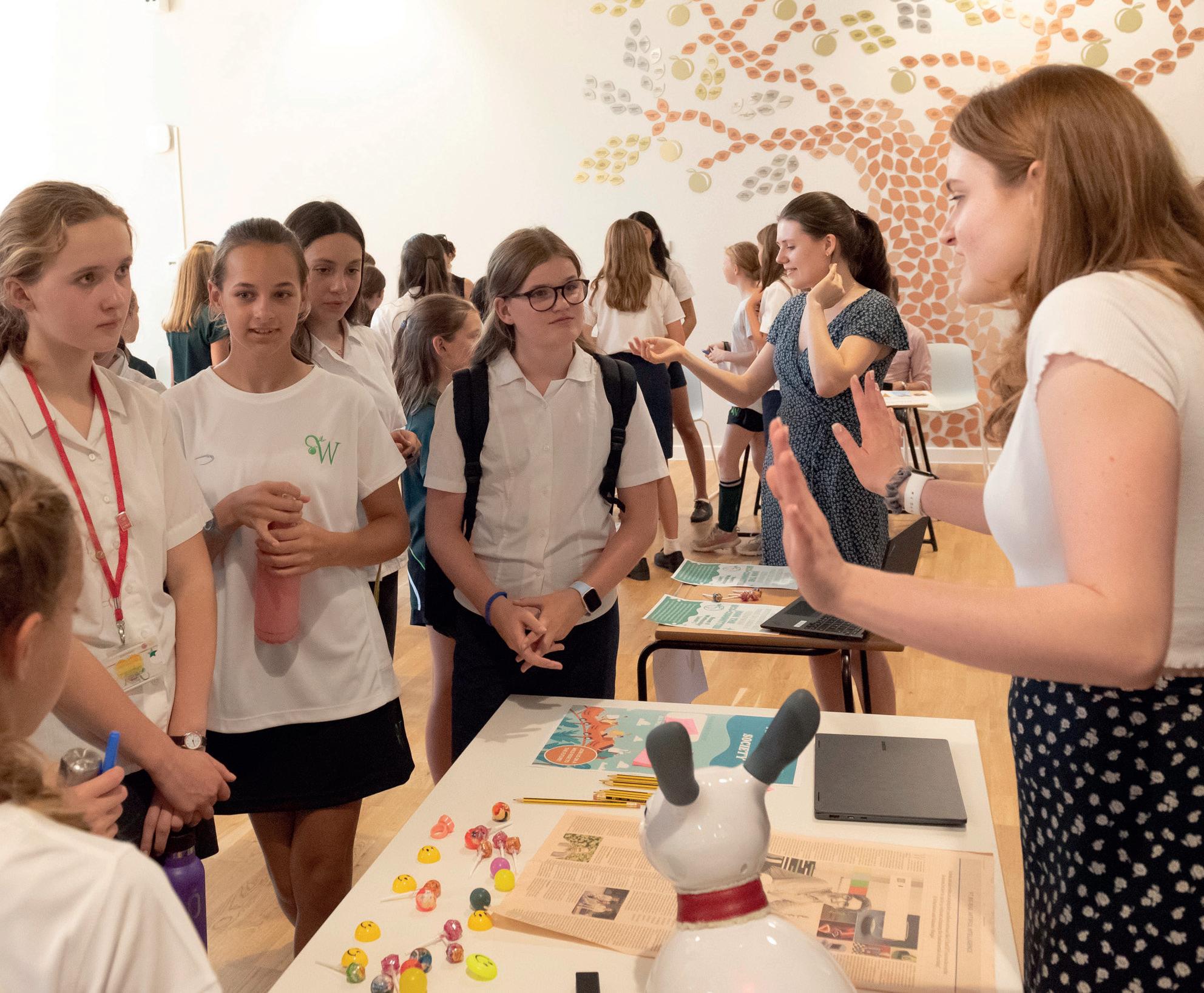

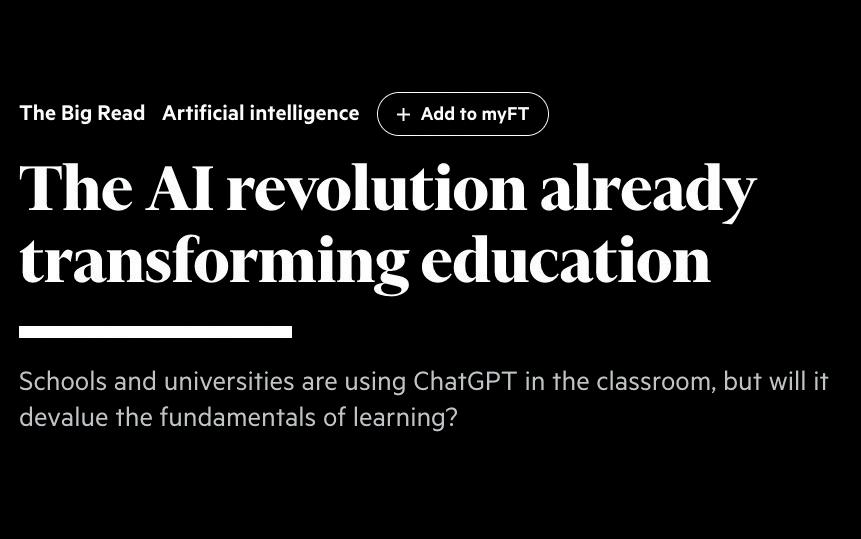
“It’s so vital not to ban the use of [AI] in education, but instead…learn how to use it through proper critical thinking. Because it will be a tool in our futures.”
Olivia, Year 12 - interviewed in the Financial Times alongside fellow students and Rachel Evans
Our teachers are passionate about extending their own subject knowledge and getting the very best out of our students.
A diversity gap
Acting Head of Physics, Helen Sinclair, investigates the claim that ‘hard maths’ puts off girls from studying Physics, and finds that the truth is much more complex than this, and is not limited to gender…
The problem of diversity in Physics is not new. The percentage of female A Level Physics students has stubbornly remained around 20% for nearly 30 years. Detailed research over the last decade shows that the causes extend far beyond the Physics classroom: schools with low numbers of girls in Physics often showed gender imbalances in other subjects too, such as English.
Girls often enter the Physics classroom with a narrower range of early, concrete preparations for Physics compared to boys, stemming from the very different toys and pursuits that they are still often exposed to in their early years. This can make it hard for them to easily identify links between core ideas studied in the classroom and their applications to their lives and career ambitions. Research shows that by exploring these applications within lessons, all students (and particularly girls) are better able to see the relevance of Physics as a subject.
Making Physics teaching more inclusive –bringing in the real world
Girls are also more likely to see value in subjects that link to social and human concerns. Because Physics tends to simplify situations in order to understand key principles, these links can often be lost, making concepts seem irrelevant to students’ lives. By making a conscious effort to link concepts to real-world problems and societal challenges, we can convey the subject’s importance more effectively to girls. For example, recently we have explored Energy Use and Climate Change with Year 9; the Chernobyl disaster, USSR and the war in Ukraine with Year 10; how seatbelts are designed for men and Tonga’s damaged data cable with Year 11.
Research has shown that girls are more interested in achieving mastery of a subject. This is particularly noticeable in our students, who often try to judge their success by comparing their achievements with others’, and who can look at anything other than perfection as a failure. This culture of perfection (which extends well beyond the Physics classroom) can make it harder for students initially to engage with more challenging problems. One of the key ways of supporting students through this is to create a more relaxed atmosphere, allowing them to discuss different approaches, and identify and learn from their mistakes. Our Physics lunch club was formed in partnership with some Year 10s who wanted to tackle challenging problems. Students ate their lunch and chatted at the same time as completing questions. The informal atmosphere encouraged them to discuss problems, rather than try to solve them individually – the club has had a significant impact on students’ enjoyment and engagement.
The wider context
Whilst there are many things an individual teacher can do, it is important to remember that the impacts of these interventions are likely to be limited. Above all, the research consistently shows that girls’ views on Physics are shaped by their interactions in wider society and the bias that is still pervasive there. Surely it is our responsibility as educators to openly address this, not just for the benefit of our students, but also for the benefit of our society.
How can abstract art develop students’ visceral feeling and creative thinking across the curriculum?
Art teacher Elin Mbeyela considers the power of abstract art, and discusses how debate and inquiry are central to the Art curriculum at WHS, allowing students to develop an open-minded and experimental approach in their own work.
I remember how I felt, as I stood in front of Ai Weiwei’s piece at his unforgettable and groundbreaking exhibition at the Royal Academy in 2015. His commemorative installation piece, titled ‘Straight’, consisted of 90 tonnes of steelreinforced rods straightened by hand after being mangled in the Sichuan earthquake. I was reminded of how art can be used as an expression of our thoughts, emotions and intuitions, and that it is even more personal than that: it’s about sharing the way we experience the world. This means it provides a platform for much discussion and debate.
We embed discussion and debate in our curriculum at WHS, right from Year 7. During the students’ first autumn term in Senior School, we explore colour theory and abstract art. We look at a range of artists such as Frank Bowling, Jadé Fadojutimi and Gillian Ayres, encouraging students to see with their mind what they don’t see physically – in essence, prompting them to explore how abstract art enables the artist and the viewer to perceive beyond the tangible. Fadojutimi’s large scale gestural paintings explore identity and emotion; she uses colour flamboyantly and applies the oil paint in thin layers, creating depth with expressive mark-making.
Jennifer Higgie, writer and critic, comments on Fadojumiti’s paintings, “Art is not an explanation: it’s a shot of energy, a flash of colour; a shimmer, a reaction, a line thrown out to see who might
pick it up… Jadé tells me that her aim is for “deep emotion, not deep description”.”
To many, the intangible nature of abstract art is uncomfortable, and they desperately want to seek some understanding and meaning in what they see. This can lead some to mock such art, and to think it is not worth their attention. In essence, they want to be able to decipher and understand it. Meanwhile, our students engage in thoughtful, creative discussions about Fadojutimi’s work. They are curious and fascinated by the possible hidden meanings and messages in her paintings. But ultimately what they are struck by is that there is no universally accepted theme or subject, and that the work allows them to make individual visual connections, thoughts and interpretations.
We value highly students’ ability to be curious; through encouraging debate and discussion in the classroom, we instil in our learners that engaging with art contributes to the refinement of emotional meaning and improves communication and interaction with others. It allows them to think creatively and expressively, without limits or boundaries. These skills are not just fundamental to studying Art but, with the school’s innovative approach to STEAM, they are crucial to our interdisciplinary curriculum.
Read more on the WHS Teaching and Learning Hub


